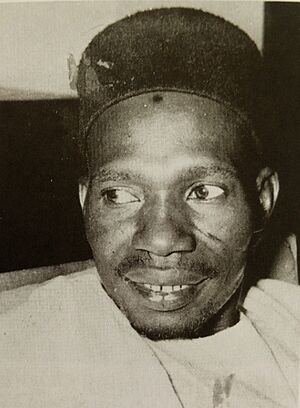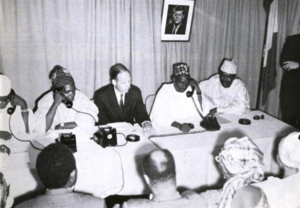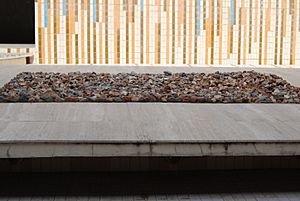Abubakar Tafawa Balewa facts for kids
Quick facts for kids
The Right Honourable Alhaji
Sir Abubakar Tafawa Balewa
|
|
|---|---|
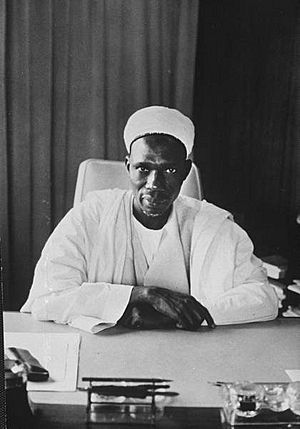 |
|
| Prime Minister of Nigeria | |
| In office 30 August 1957 – 15 January 1966 |
|
| Monarch | Elizabeth II (until 1963) |
| President | Nnamdi Azikiwe (from 1963) |
| Governor-General |
|
| Preceded by | Position established |
| Succeeded by | Position abolished (Johnson Aguiyi-Ironsi as Military head of state) |
| Deputy Leader of the Northern People's Congress | |
| In office 30 August 1957 – 15 January 1966 |
|
| Leader | Ahmadu Bello |
| Preceded by | Position established |
| Succeeded by | Position abolished |
| Personal details | |
| Born | December 1912 Bauchi, Northern Nigeria Protectorate |
| Died | 15 January 1966 (aged 53) near Lagos, Nigeria |
| Resting place | Tafawa Balewa's tomb |
| Political party | Northern People's Congress |
| Alma mater |
|
| Occupation | Politician |
Sir Abubakar Tafawa Balewa (born December 1912 – died 15 January 1966) was a very important Nigerian politician. He became the first and only Prime Minister of Nigeria when the country gained its independence.
| Top - 0-9 A B C D E F G H I J K L M N O P Q R S T U V W X Y Z |
Early Life and School
Abubakar Tafawa Balewa was born in December 1912. This was in an area now known as Bauchi State in Nigeria. His father, Yakubu Dan Zala, was from the Gere people. His mother, Fatima Inna, had both Gere and Fulani roots. His father worked for a local leader in the Bauchi area.
His Education Journey
Balewa started his schooling at a Qur'anic school in Bauchi. Later, he went to Tafawa Balewa Elementary School. He then attended Bauchi Provincial School. Like many students of his time, he studied at Barewa College. This school was then called Katsina College.
The college was far from his home. During holidays, Balewa would walk more than 400 kilometers to get home. He walked about 40 kilometers a day. The whole trip took him 10 days.
Katsina College had British teachers. Many of them came from top British universities. Students learned in English, and speaking well was very important. The school also trained teachers for other schools in Nigeria.
Balewa finished his studies in 1933. He went back to Bauchi to teach at Bauchi Middle School. He became a senior teacher there. In 1944, Balewa and other teachers went to study in London. They attended the University of London's Institute of Education. When he returned to Nigeria, he became an Inspector of Schools. Soon after, he decided to enter politics.
Getting Started in Politics
Balewa was elected to the Northern House of Assembly in 1946. In 1947, he joined the Legislative Council. As a legislator, he spoke strongly for the rights of Northern Nigeria. He believed the northern and southern parts of Nigeria were not equally ready for independence.
He worked with Alhaji Sir Ahmadu Bello. They helped change a cultural group into a political party. This party was called the Northern People's Congress (NPC). Balewa became the Vice President of this new party. He then left his teaching job. The NPC won many votes in the 1951 elections.
Becoming a Minister
Balewa became a federal minister in 1952. He first served as the Minister of Works. Later, he became the Minister of Transport. This was a time when Nigeria was moving towards self-rule. During his time as Transport Minister, he helped turn the Marine and Railway departments into corporations. He also helped plan a bridge over the Niger River and the Kainji Dam.
Chief Minister (1957-1960)
In 1957, the NPC won the most votes in the Federal House of Representatives. Balewa then became the Chief Minister. He was also chosen to be the Prime Minister. To unite the country before independence in 1960, he formed a special government. This government included leaders from different parties. He wanted everyone to work together for Nigeria's future.
Prime Minister (1960-1966)
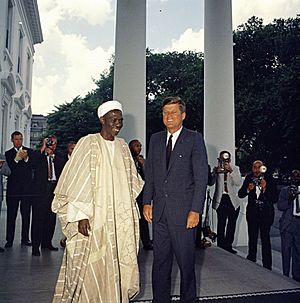
Balewa remained the Prime Minister of Nigeria when Nigeria became independent in 1960. He was reelected in 1964.
On January 18, 1959, he announced Nigeria's path to independence to the Parliament. He said it was a "great day for Nigeria" and the "beginning of the last stage of our march toward independence."
How Nigeria Was Governed
Before Nigeria became independent, a special meeting in 1954 decided how the country would be run. It was decided that Nigeria would have different regions. Each region would have a lot of political freedom. The leaders of these regions often tried to protect their areas from other regional leaders. This made Balewa's time as Prime Minister challenging.
Foreign Policy
As Prime Minister, Balewa also handled Nigeria's foreign affairs from 1960 to 1961. In 1961, a special minister was appointed for Foreign Affairs.
Africa
Balewa played a big part in Africa's journey to self-rule. He helped create the Organisation of African Unity. This group aimed to bring African countries together. He also worked to build good relationships with French-speaking African nations. He was important in talks during the Congo Crisis. He strongly spoke out against the Sharpeville Massacre in 1960. He also worked with other leaders to make South Africa leave the Commonwealth of Nations in 1961.
United States
Balewa visited the United States in 1961. He had great respect for President John F. Kennedy. In 1963, he took part in a special NASA program called Syncom 2. This allowed him to make the first live phone call between heads of government using a satellite. He called President Kennedy from Lagos.
Commonwealth
Balewa believed that being a member of the Commonwealth of Nations was very important for Nigeria.
Eastern Bloc
Balewa preferred to work with Western countries. He was not keen on the Soviet Union and other Eastern Bloc countries. Because of this, communist writings were banned in Nigeria. Students were also told not to accept scholarships from the Soviet Union. Balewa promised the British government that he would prevent communist ideas from spreading in Nigeria.
His Death
Sir Abubakar Tafawa Balewa died on January 15, 1966. His body was found near Lagos a few days after he was removed from office. He was buried in Bauchi. News of his death led to unrest in Northern Nigeria.
Shaihu Umar
In 1933, Balewa wrote a short novel called Shaihu Umar. He wrote it to help promote Hausa literature. The book was first published in 1934. It was later translated into English in 1967.
The story is about a religious Muslim man named Shaihu Umar. He tells about events in his life. The book talks about the trans-Saharan slave trade, family, and Islamic ideas of trusting in God. Shaihu Umar was also made into a play in the 1970s.
Honours and Legacy
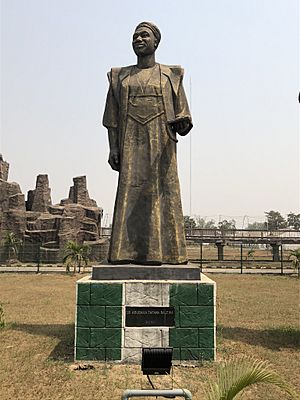
In January 1960, Queen Elizabeth II made Balewa a Knight Commander of the Order of the British Empire. He also received honorary degrees from the University of Sheffield and New York University.
Balewa's picture is on the 5 Naira banknote. The Abubakar Tafawa Balewa University and the Sir Abubakar Tafawa Balewa Bauchi State International Airport are named after him.
Personal Life
People described Balewa as a humble person. When he died, his main belongings were his house in Bauchi and a 50-acre farm. He would relax at this farm, which was about nine miles from Bauchi. Many important decisions were made at this farm. Balewa was married to four women and had nineteen children. He was buried in Tafawa Balewa's tomb in Bauchi.
See Also
 In Spanish: Abubakar Tafawa Balewa para niños
In Spanish: Abubakar Tafawa Balewa para niños
- Nigerian First Republic
- Cabinet of Abubakar Tafawa Balewa
 | Anna J. Cooper |
 | Mary McLeod Bethune |
 | Lillie Mae Bradford |


